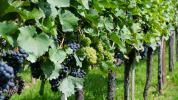H2020 VISCA Project: Integrated Climate-Smart Vineyard Application
- Type Project
- Status Filled
- Execution 2017 -2020
- Assigned Budget 3.195.065,72 €
- Scope Europeo
- Autonomous community Cataluña
- Main source of financing Horizon 2020
- Project website https://doi.org/10.3030/730253
The VISCA project has co-designed, developed, and validated a Climate Service and Decision Support System (VISCA CS-DSS) to help winegrowers adapt to climate change. It includes the following services:
- Weather forecasting with two time scales: short-term (2 days ahead) and medium-term (10 days ahead). These forecasting services are designed to provide specific weather information for planning daily activities, as well as to anticipate extreme events such as spring frosts, heat waves, strong winds, or intense precipitation by using high-resolution downscaling approaches (D2.2).
- The seasonal forecast consists of a multi-model forecast of the seasonal climate up to 6 months in advance (D2.1).
- Phenological forecast that includes a bud break model, a berry model (which predicts flowering and veraison), and a leaf model (which predicts vegetative growth of the plant, including berries and their ripening) (D2.3).
- Irrigation recommendations, which provide irrigation forecasts considering the plan's water demands, past weather observations, weather forecasts, and the water stress strategy (D2.4). All these services are operational and can be visualized through the VISCA Data Platform, where users can view service outputs and simultaneously provide feedback with real-world field data (D3.4). All developed services have been field-validated in three pilot sites in Portugal, Spain, and Italy.
In addition, two innovative crop management techniques, crop forcing and shoot thinning, have been tested to assess their added value in combating climate change (D4.8). The VISCA project has also developed regional climate projections at the European level and for specific validation sites, drawing interesting conclusions about the suitability of vines in the coming decades (D2.5). METEOSIM will take the lead in introducing VISCA results to the market, acting as distributor of the entire solution. All developed services and the VISCA data platform can be used independently.
The VISCA consortium has disseminated VISCA results through the project website, social media presence, workshops, promotional materials (VISCA results brochure, flyers, roll-ups, presentations), scientific publications, press releases, e-newsletters, and presence at specific events, among others. Future work includes the addition of other complementary services such as disease management and the replicability of VISCA for other grape varieties and agricultural crops such as olives, rice, and cereals, which face similar challenges.
SIGNIFICANT IMPACTS: VISCA has demonstrated that climate data can be properly digested to improve vine management, having a positive impact on crop planning in the following ways:
- VISCA has promoted more efficient crop management by anticipating extreme events, predicting phenology, managing pests, and forecasting sugar accumulation.
- VISCA has demonstrated that innovative management practices, such as crop forcing and shoot cutting, have enormous potential for crop management and a positive impact on climate variability management.
- VISCA has promoted the proper use of water resources, improving wine quality and reducing water consumption, where necessary, in line with a more resource-efficient, greener, and more competitive economy.
- VISCA has promoted the use of climate data from various European Commission initiatives such as Copernicus, making these data useful information for viticulture and making it more climate-resilient.
- VISCA's experiences and results have motivated the formulation of climate policies to catalyze the exploitation of VISCA's added value.
- The exchange of information between VISCA's multidisciplinary team and with external stakeholders, bringing science closer to farmers and, at the same time, bringing user needs closer to scientists, has facilitated understanding of the problems and potential solutions.
- Understanding the potential of climate information has empowered farmers to make informed decisions, including:
- PROGRESS BEYOND THE STATE OF THE ART: VISCA has laid the groundwork for a revolutionary approach by using phenological models, irrigation models, sugar accumulation models, and climate models, as well as testing innovative management techniques (such as crop forcing and bud thinning) to make climate-resilient decisions that take into account short-, medium-, and seasonal variability and its agronomic impact. Farmers and other users can choose to implement decisions that reduce costs, increase yield, or improve wine quality, as well as improve the use of resources such as water resources for irrigation or human and material resources when planning field activities. In this way, VISCA has promoted sustainable practices that have a positive impact on the productivity and income of farmers/users.
- MOST SIGNIFICANT RESULTS: (1) A ready-to-use VISCA, interoperable services including weather forecast (D2.1), seasonal forecast (D2.1), phenology forecast (D2.3), irrigation forecast (D2.4). (2) European climate change scenarios for viticulture suitability (D2.5). (3) A ready-to-use VISCA CS-DSS platform (D3.3 and D3.4) providing climate-informed decisions to the wine industry. (4) Real-life demonstration of the strategic adaptation decisions provided by this tool in 3 areas where the wine business is most sensitive to climate change (Spain, Italy and Portugal). (D4.8) (5) Action plan to address barriers and opportunities arising from the use of VISCA CS-DSS in 3 pilot sites (D4.9) (6) Comprehensive assessment of the potential for replicability in other relevant sectors (forestry, food security, etc.) at international level (D5.4)
The internationalization of markets has enabled the globalization of agriculture, directly or indirectly benefiting relevant countries and even entire regions such as the EU, the world's leading trader of agricultural products. Among the different varieties of agricultural species, wine grapes are particularly threatened by climate change, as subtle differences in microclimate directly impact the process through overripening, increased acidity, greater vulnerability to pests and diseases, and so on, resulting in changes in the quality and properties of wine.
Therefore, the wine industry needs to implement adaptation measures, and long-term adaptation planning will provide producers with a comparative advantage over their competitors. VISCA is a Climate Service (CS) and a Decision Support System (DSS) that integrates climatic, agricultural, and end-user specifications to design medium- and long-term climate change adaptation strategies. VISCA will be validated through a real-world demonstration with end-users at three demonstration sites belonging to three wine sector players from Spain, Italy, and Portugal, consortium partners (Codorniu, Mastroberardino, and Symington). VISCA's main objective is to make Southern European wine industries resilient to climate change, while minimizing costs and risks by improving production management (quality and quantity of the final product).
This goal will be achieved by integrating climatic, phenological, irrigation model, and end-user data into a Decision Support System (DSS) co-designed with wine producers in Spain, Italy, and Portugal. VISCA will provide informed decisions on specific aspects of crop planning (e.g., budbreak, harvest, defoliation, minimum water requirements) and suggest preventive actions against extreme events and long-term suitability maps.
Spain, France, and Italy alone, the leading wine-producing Member States, accounted for one-third of the world's vineyards in 2019 (Opens in new window). Predicting local climate variations, critical for quality and quantity, has always been fraught with uncertainty; climate change and severe weather events have significantly amplified this and its subsequent effects. The EU-funded VISCA project (Opens in new window)
The project has developed and demonstrated (opens in a new window) the potential of a decision support system (DSS) to improve the resilience of wine grape farms facing increasing climate-related challenges. Science is helping farmers. Farmers continuously assess potential adverse conditions at all timescales. Typically, short-term decisions (a few days in advance) are based on weather data using global or regional models, which reduces the accuracy of local predictions. For decisions made weeks (medium-term) or months (seasonal or long-term) in advance, experience has been the guide, but it is no longer as reliable given climate change and sudden extreme weather events.
Project coordinator Josep Maria Solé Tasias of METEOSIM SL (Opens in new window) explains: "VISCA DSS (Opens in new window) integrates climate and agricultural models with real vineyard data to identify effective adaptation strategies. It includes short-, medium-term, and seasonal weather forecasts, as well as climate projections linked to agricultural models to enable forecasts of phenology (the seasonal growth cycle of vines), irrigation requirements (Opens in new window), and sugar accumulation." The forecasts can identify the likelihood of extreme events such as heat waves, heavy precipitation, or spring frosts several days or months in advance. The intuitive user interface also simplifies the interpretation of novel and complex analyses, and the platform is easily accessible on smartphones, tablets, and computers. Customized planning: VISCA DSS data, charts, and services are flexible and modular, and can be operated separately.
Users provide initial information about the vineyard, including plot definition, irrigation regime, and essential characteristics such as soil type and grape varieties. They can then upload actual data, such as actual irrigation, either manually or automatically; updates are used to improve future forecasts. The services are interconnected, and data is updated daily, weekly, or monthly, depending on the service. Solé Tasias explains: "The most important benefit of VISCA DSS is that, unlike most existing solutions, it integrates and couples meteorological and agronomic services into a single, easy-to-use platform. It also incorporates the latest techniques to improve climate change adaptation in vineyards." Crop forcing (opens in a new window) shifts the grape ripening period from the hot summer months to a cooler month later in the growing season, and shoot trimming (opens in a new window) slows sugar accumulation. Xavier Bordes of Codorníu (Opens in new window), where the crop forcing technique was applied to a plot to achieve grape ripening in October instead of July, says: "VISCA DSS helps us make better decisions about vineyard management. Without it, we wouldn't be able to explore the optimal pruning date to implement the crop forcing technique in time."
It also helped minimize the spread of mildew (fungus) during a wetter than normal spring and hotter than normal summer in Spanish vineyards. Here's to greater resilience, more secure livelihoods, and a bountiful table. Field trials in Spain(Opens in new window), Italy(Opens in new window), and Portugal(Opens in new window) have demonstrated the usefulness of the models' predictions, and this should improve with increasing user input. The VISCA DSS should be similarly useful in other countries and for other crops, including olives, cereals, and rice. In short, VISCA has given us all a reason to raise our glasses and cheer.
- METEOSIM SL
- CODORNIU SA
- UNITE TECHNIQUE DU SEMIDE GEIE
- SYMINGTON FAMILY ESTATES, VINHOS,SA
- UNIVERSITA DEGLI STUDI DI NAPOLI FEDERICO II
- ALPHA CONSULTANTS (UK) LTD
- INSTITUT DE RECERCA I TECNOLOGIA AGROALIMENTARIES
- UNIVERSIDADE DO PORTO
- FONDAZIONE LINKS - LEADING INNOVATION & KNOWLEDGE FOR SOCIETY
- MASTROBERARDINO SOCIETA AGRICOLA SRL
- BARCELONA SUPERCOMPUTING CENTER CENTRO NACIONAL DE SUPERCOMPUTACION
- CORDIS project factsheet (pdf)
- First Annual Report
- Ten-Year Projection Performance Report
- Main barriers and solutions found in the implementation of DSS
- Second Annual Report
- Communication and Dissemination Plan
- Technical specifications
- End-user requirements
- Innovation Management Plan
- Seasonal Forecast Prediction Quality Assessment Report
- Second preliminary report between research teams (WP2), DSS developers and end-…
- Kick-off meeting report
- First preliminary report between research teams (WP2), DSS developers and end u…
- Weather forecast report for extreme events
- Assessment of the feasibility of DSS based on climate change projections in thr…
- Main barriers and solutions found in the implementation of DSS (Edition 2)
- METEOSIM SL website
- UNITE TECHNIQUE DU SEMIDE GEIE website
- UNIVERSITA DEGLI STUDI DI NAPOLI FEDERICO II website
- INSTITUT DE RECERCA I AGRO-FOOD TECHNOLOGY website
- University of Porto website
- Website of the Barcelona Supercomputing Center







